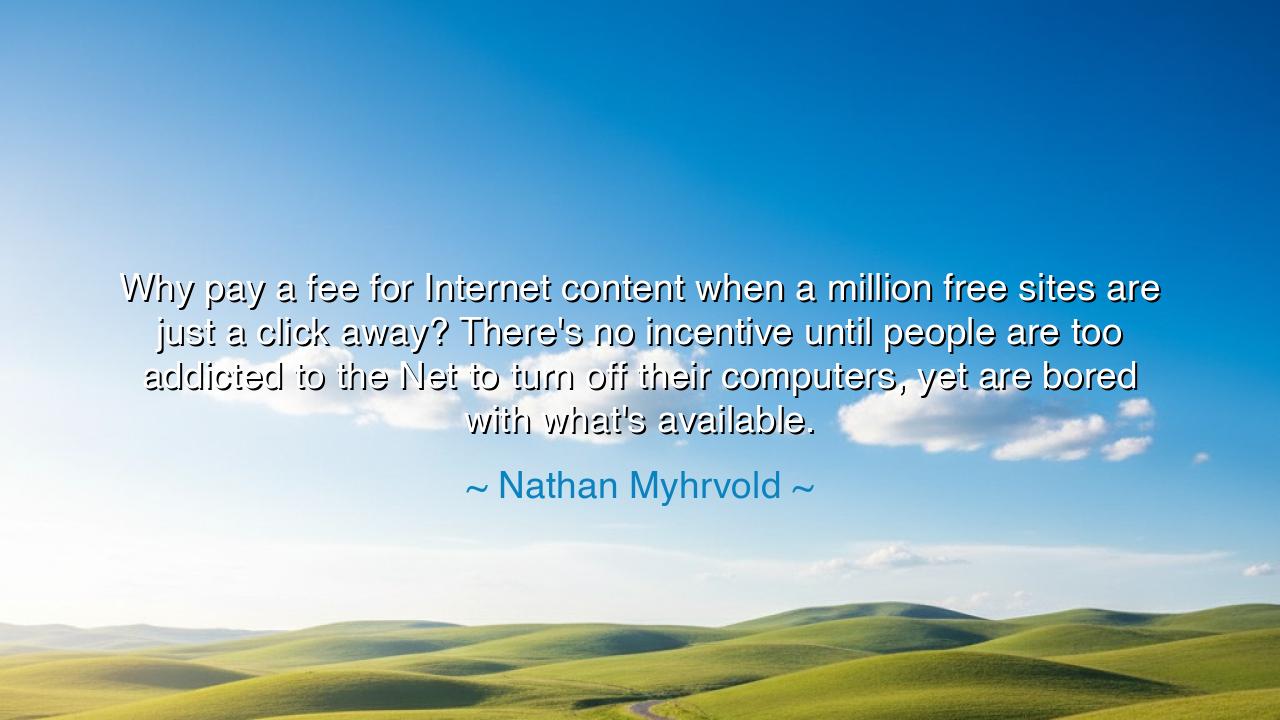
Why pay a fee for Internet content when a million free sites are
Why pay a fee for Internet content when a million free sites are just a click away? There's no incentive until people are too addicted to the Net to turn off their computers, yet are bored with what's available.






“Why pay a fee for Internet content when a million free sites are just a click away? There's no incentive until people are too addicted to the Net to turn off their computers, yet are bored with what's available.” Thus spoke Nathan Myhrvold, a visionary of the digital age — a thinker who saw both the brilliance and the peril of human invention. His words, though spoken in the tongue of technology, resound with the eternal rhythm of wisdom: the warning that abundance without discernment leads to emptiness, and that freedom without value breeds captivity. In this reflection, Myhrvold reveals the paradox of modern civilization — that in seeking boundless access, humanity risks losing its sense of meaning.
In the ancient days, sages warned that man’s desires, once unbridled, would become chains. The philosophers of Greece spoke of moderation, the Buddha of detachment, the prophets of discipline — yet the lesson remains unlearned. Myhrvold, a scholar of innovation and former chief technologist of Microsoft, saw how the Internet, once a tool of discovery, had become a mirror of compulsion. He foresaw a future where the human mind, drowning in choice, would mistake quantity for richness and noise for knowledge. The tragedy, he tells us, is not that the web offers too little, but that it offers too much — and yet too little of value.
His words are both observation and prophecy. In the infancy of the Internet, knowledge was new, connection was wonder, and every website a window into uncharted possibility. But as the years passed, content multiplied while attention divided. Free information flooded the world — yet the abundance of the trivial drowned the sacred. Myhrvold understood that when people are given a thousand choices, they grow weary, not wise. The mind, once sharp with curiosity, becomes dulled by overstimulation, seeking not truth but distraction. The soul, deprived of stillness, grows addicted to motion without meaning.
Consider the story of King Midas, who prayed that all he touched might turn to gold. His wish was granted — but when his food, his drink, and even his daughter became lifeless metal, he realized that abundance without wisdom is curse, not blessing. So too with the Internet. Humanity has touched knowledge and turned it to gold — accessible, infinite, and free — but in doing so, we risk losing the living essence of it. We scroll endlessly, consuming but not savoring, connected yet alone, rich in data but poor in depth. Myhrvold’s warning is not about technology alone, but about the human condition in an age where access outpaces understanding.
He speaks also of the market of attention, where creators strive to capture what is already captive — the human gaze. “Why pay a fee?” he asks, for the question is not merely economic, but moral. We have forgotten the value of creation, expecting art, music, and wisdom to be free because it is everywhere. But what is free is often taken for granted. When the sacred becomes common, reverence fades. Myhrvold’s words remind us that value must be chosen, not assumed — and that a world drowning in free content will one day long for what is worth paying for: truth, craft, and meaning.
Yet the heart of his statement is not despair but revelation. Myhrvold saw that the addiction to the screen would grow — that men and women, too weary to disconnect yet too restless to be satisfied, would live in a loop of distraction and dissatisfaction. But in that cycle lies the seed of awakening. For boredom, too, can be a teacher. It is the mind’s cry for depth, the soul’s hunger for substance. When we find ourselves bored amidst infinite entertainment, it is not because the world has grown shallow, but because our spirits call us to seek the profound once more.
Therefore, O listener of the digital age, let Myhrvold’s wisdom be your compass. Do not mistake access for understanding. Do not confuse abundance with fulfillment. Choose what you consume as you would choose the food that nourishes your body. Pay — not only with money, but with attention, with reverence — for that which uplifts the mind and strengthens the heart. Step away from the glowing void when it no longer feeds you; seek silence, reflection, creation. For technology, though mighty, is but a servant — and when the servant becomes the master, man forgets his crown.
Thus, remember this teaching: the Internet is infinite, but your time is not. Use it not to escape, but to expand. Let your curiosity be guided by purpose, your consumption by conscience, and your innovation by wisdom. For Myhrvold’s warning is not a curse upon progress, but a call to reclaim it — to ensure that the greatest invention of the modern age serves humanity’s growth, not its decay. In this way, we may yet turn our screens from mirrors of addiction into windows of enlightenment.






AAdministratorAdministrator
Welcome, honored guests. Please leave a comment, we will respond soon